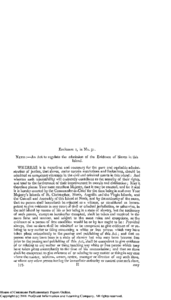Full Transcript
WHEREAS it is expedient and necessary for the pure and equitable administration of justice, that slaves, under certain restrictions and limitations, should be admitted as competent witnesses in the civil and criminal courts in this island: And whereas such admissibility will eminently contribute to the security of their rights, and tend to the furtherance of their improvement in morals and civilization; May it therefore please Your most excellent Majesty, that it may be enacted, and be it and it is hereby enacted by the Commander-in-Chief for the time being in and over Your Majesty’s Islands of St. Christopher, Nevis, Anguilla and the Virgin Islands, and the Council and Assembly of this Island of Nevis, and by the authority of the same, that no person shall henceforth be rejected as a witness, or considered as incompetent to give evidence in any court of civil or criminal jurisdiction, or otherwise, in the said island by reason of his or her being in a state of slavery, but the testimony of such person, except as hereinafter excepted, shall be taken and received in the same form and manner, and subject to the same rules and exceptions, as the evidence of a person of free condition would be or by law ought to be: Provided always, that no slave shall be admitted or be competent to give evidence of or relating to any matter or thing concerning a white or free person which may have taken place antecedently to the passing and publishing of this Act; and that no person who may have been in a state of slavery but who may have become free prior to the passing and publishing of this Act, shall be competent to give evidence of or relating to any matter or thing touching any white or free person which may have taken place antecedently to the time of his manumission; and that no slave shall be competent to give evidence of or relating to any matter or thing in any case where the master, mistress, owner, renter, manager or director of any such slave, or where any other person having the immediate authority or control over such slave, may be charged with or prosecuted for any capital offence without the benefit of clergy, or a second time after a former conviction for any clergyable felony, any law, usage or custom to the contrary thereof in anywise notwithstanding.
[Clause 2.] And be it further enacted, that in all cases wherein a slave shall give any false evidence, or commit wilful and corrupt perjury, upon any trial, civil or criminal, or upon the investigation of any charge or complaint, such slave being duly convicted thereof shall be subject and liable to such lawful corporal punishment as the court shall think fitting; and such slave being convicted of wilful and corrupt perjury shall be rendered thereafter for ever incapable of becoming a witness.
[Clause 3.] And be it further enacted, that in all cases where the attendance of any slave shall henceforth be required in any court, or before any magistrate, or for any purpose relating to the administration of justice, the same process shall and may issue as shall or might be used in the case of a white or free person; but such process not being to apprehend or commit to gaol the body of any slave, shall be directed to and served upon the master, mistress, owner, renter, manager or director, or other person having the immediate authority or control over such slave, and shall name the slave and express the purpose for which such slave may be required, commanding such persons respectively to procure the attendance of such slave according to the exigency of the process; and whosoever shall not duly obey such process accordingly, shall be liable to and suffer the same pains, penalties and forfeitures as any person now by law would be liable to and suffer if such process had issued out of the court of King’s Bench and Common Pleas of this island, and were directed to him requiring his personal appearance or attendance in that court.
[Clause 4.] And be it further enacted, that this Act shall be in force for the space of five years from the time of publishing the same in Charles-town, in the said Island of Nevis, and until the expiration or dissolution of the then sitting House of Assembly of this island.
Dated at St. Christopher, this 2d day of October, in the ninth year, of the reign of Our Sovereign Lord George the Fourth, by the grace of God of the United Kingdom of Great Britain and Ireland King, Defender of the Faith, and in the year of our Lord 1828.
(signed) Wm. Pemberton, Speaker.
Date
Location
Citation
Download Original
Images published from the ProQuest House of Commons Parliamentary Papers product (HCPP) with permission of ProQuest LLC. Further reproduction is prohibited without permission.
